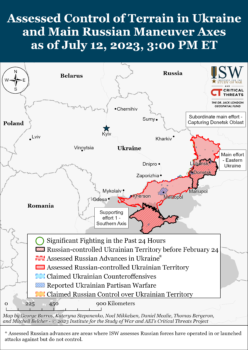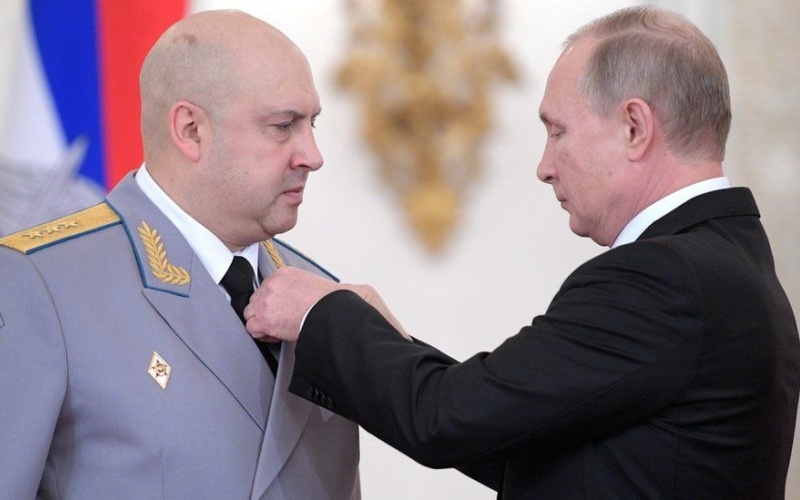Gen. Sergey Surovikin, decorated by Vladimir Putin for his command of Russian operations that killed thousands of civilians in Syria (Alexey Druzhinin/Sputnik)
EA on Australia’s ABC: Ukraine, the NATO Summit, and Putin v. Prigozhin
Thursday’s Coverage: Zelenskiy — “A Good Result” From NATO Summit

Map: Institute for Study of War
UPDATE 1528 GMT:
Turkish President Recep Tayyip Erdoğan says Russia has again stepped back from ending the July 2022 deal lifting its blockade of three Ukrainian ports on the Black Sea.
Erdoğan told reporters he had spoken with Vladimir Putin about Moscow’s threat to renew the deal on Monday, when a two-month extension expires.
“We are preparing to welcome Putin in August and we agree on the extension of the Black Sea grain corridor,” the President said.
He referred to a letter sent by UN Secretary General António Guterres to Putin this week, proposing a resolution with steps removing obstacles to Russia exporting its fertilizers.
[I hope] that with this letter we will ensure the extension of the grain corridor with our joint efforts and those of Russia.
But Kremlin spokesman Dmitry Peskov said Russia has not made any statements about a renewal of the deal. He has also knocked back Erdoğan’s claim that Putin is visiting Turkey in August.
On Thursday, Putin said that “not one” of Moscow’s conditions had been met: “I want to emphasize that nothing was done, nothing at all. It’s all one-sided. We will think about what to do, we have a few more days.”
UPDATE 0956 GMT:
Vladimir Putin has spoken about his three-hour meeting on June 29 with the head of the Wagner Group mercenaries, Yevgeny Prigozhin, five days after Wagner’s rebellion advanced on Moscow.
Putin told the Russian daily Kommersant that he offered the mercenaries an opportunity to continue in the Russian armed forces: “Nothing would have changed for them. All of them could have gathered in one place and continued to serve.
Putin said the fighters “would have been led by the same person who was their real commander all this time” — reportedly an officer named Andrey Troshev, a former police colonel and veteran of the wars in Afghanistan and Chechnya.
Prigozhin turned down the offer, Putin said, claiming that some Wagner commanders themselves were prepared to accept.
Many people nodded when I said that. But Prigozhin, who was sitting in front and didn’t see it, said after listening: “No, the boys don’t agree with this decision.”
Under the June 24 deal ending the 36-hour rebellion, Wagner’s men were to move to Belarus. Putin did not clarify if his offer five days later was for the mercenaries to remain in Belarus, to return to the frontline of the Russian invasion, or to be stationed inside Russia.
Putin did not explain why Prigozhin remains in Russia, despite the deal’s provision that the Wagner leader relocate to Belarus.
UPDATE 0938 GMT:
Russia is closing Poland’s consulate in Smolensk in the west of the country.
The Cabinet’s press service said, “The Russian Government’s order was approved as a retaliatory measure, allowing for the restoration of parity of Russian consular institutions in Poland and Polish institutions in Russia.”
The consulate in Smolensk was opened in 2011 to develop bilateral relations and to expand contacts between Russian and Polish citizens.
UPDATE 0917 GMT:
The US military says the time is not right for the delivery of F-16 fighter jets to Ukraine.
Lt. Gen. Douglas Sims, the Director of Operations of the Joint Staff, told a press briefing on Thursday:
The conditions right now for the employment of the F-16s are probably not – they’re probably not ideal.
“I mean, the Russians still possess some air defense capability. They have air capability. And the number of F-16s that would be provided may not be perfect for what’s going on right now.
Sims said the situation is changing over time, dictating how fighter jets will be employed in the future.
UPDATE 0810 GMT:
France has awarded the Legion d’Honneur to video journalist Arman Soldin, who was killed by Russian fire near Bakhmut in eastern Ukraine on May 9.
The Agence France Presse crew were walking back to their car close to the village of Chasiv Yar when they were attacked by Grad rockets.
See also Reporting Inhumanity and Humanity From Bosnia to Ukraine: The Story of Arman Soldin
UPDATE 0805 GMT:
The Japanese automaker Isuzu has confirmed its departure from the Russian market.
Isuzu transferred the shares of its Russian subsidiary to the local company Sollers. It said the move is because of the lack of components due to international sanctions.
UPDATE 0741 GMT:
The Ukraine Air Force says it downed 16 of 17 drones launched by Russia overnight on the Odesa, Mykolaiv, and Dnipropetrovsk regions.
However, not all air targets were eliminated. The hit was in #KryvyiRih, #Dnipropetrovskregion.
The utility company was attacked, one administrative building on its territory was destroyed. 56-year-old man injured in Russian drone attack
📸: Dnipro Regional State Administration pic.twitter.com/3SYolaVVNX
— SUSPILNE NEWS 📰 (@suspilne_news) July 14, 2023
UPDATE 0726 GMT:
Both US Defense Department and the Ukrainian commander of ground forces have confirmed that American-supplied cluster munitions are now in Ukraine.
Lt. Gen. Douglas Sims, the Director of Operations for the US Joint Staff, told reporters that “cluster munitions have indeed been delivered to Ukraine at this point”.
On Thursday, Ukraine commander Brig. Gen. Oleksandr Tarnavskyi said:
We just got them, we haven’t used them yet, but they can radically change [the battlefield]. The enemy also understands that with getting this ammunition, we will have an advantage. The enemy will give up that part of the terrain where it is possible to use this.
Tarnavskyi emphasized the restrictions on the use of the munitions, with prohibition in heavily populated areas even if they are occupied by Russian forces.
ORIGINAL ENTRY: Russian security services detained at least 13 high-ranking military officers after the rebellion of Wagner Group mercenaries on June 23-24, according to multiple sources speaking to The Wall Street Journal.
Those held include General Sergey Surovikin, the former commander of Vladimir Putin’s invasion of Ukraine, and former Deputy Defense Minister Col.-Gen. Mikhail Mizintsev.
Another 15 officers have been fired or suspended.
The sources confirmed that Surovikin was detained a few hours after the beginning of the rebellion. If true, that means the general’s video appeal to Wagner fighters to lay down their arms, with him seated in a bare room holding a sub-machine gun, was broadcast after he had been seized.
The general is reported not in prison, but is being held in a location in Moscow and has been interrogated “many times”. He has yet to be charged with a crime.
One source said Surovikin knew about the plans of Wagner Group head Yevgeny Prigozhin; however, he did not participate in the rebellion as it seized the city of Rostov-on-Don — the headquarters of the Southern Military Command overseeing the Ukraine invasion — and advanced to within 200 km (125 miles) of Moscow.
On Wednesday, On 12 July, Andrey Kartapolov, the head of the Duma’s Defense Committee, said Surovikin “is on vacation” and “is so far not available”.
“They Cannot Be Trusted Anymore”
A source said, “These detentions are connected with removing those who, as it is thought, cannot be trusted anymore.”
The Dossier Center, an investigative journalism organization founded by Russian opposition figure Mikhail Khodorkovsky, claims that it has documents showing Surovikin and 30 other Russian generals were honorary members of Wagner. Surovikin had a personal badge with the number M-3744.
Some of the officers have been released from detention. They include Surovikin’s deputy Andrey Yudin and Vladimir Alekseev, the deputy head of military intelligence.
But Yudin and Alekseev are suspended with their movements limited as they are kept under surveillance.
Like Surovikin, Alekseev was filmed making an appeal to Wagner to halt its operations.
Mizintsev, the former Deputy Defense Minister, joined Wagner at the end of April as its deputy head, according to Prigozhin.
In spring 2022, the colonel-general led the 12-week bombing, siege, and ground of the port city of Mariupol in southeast Ukraine. The attacks killed thousands of civilians.
In contrast to the detained officers, Wagner’s Prigozhin is still free. Under the terms of the deal ending the 36-hour rebellion, he was supposed to move to neighboring Belarus. However, he soon returned to Russia.
On June 29, Putin held a three-hour meeting with Prigozhin and Wagner Group commanders, as the Kremlin tried to bring mercenaries into the Russian armed forces — and to ensure its control of the holdings of raw materials and mineral resources controlled by Wagner in its overseas operations.
On Wednesday, the Russian Defense Ministry claimed that it had recovered more than 2,000 pieces of military hardware, including tanks, from Wagner.
The US Defense Department said on Thursday, “At this stage, we do not see Wagner forces participating in any significant capacity in support of combat operations in Ukraine.”
Pentagon spokesman Pat Ryder said analysts assess that while not on the frontline, the majority of Wagner fighters are still in Russian-occupied areas.


Trackbacks/Pingbacks